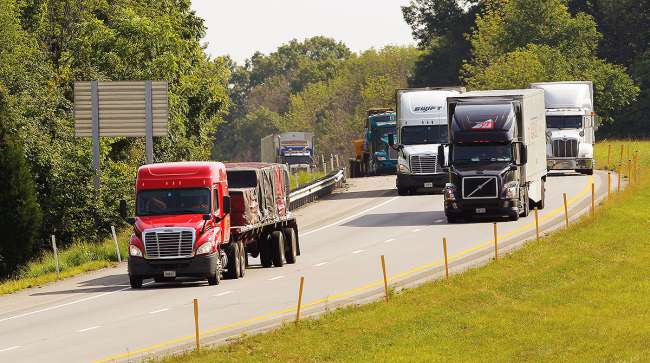Staff Reporter
How Fleets Can Mitigate Impact of Coronavirus

[Ensure you have all the info you need in these unprecedented times. Subscribe now.]
Trucking companies have been uniquely impacted as the coronavirus reaches every corner of the economy. But being aware of critical information and taking proactive steps can help them.
“This might require carriers to take a leap of faith, become more flexible and creative, and perhaps even trade some future upside in margin for volumes and rate commitments that allow carriers to keep trucks rolling today,” FTR analyst Avery Vise told Transport Topics.
Vise said there have been many predictions about how trucking capacity will tighten severely and rates will soar later in the year.
COVID-19 Truck Freight Reco... by Transport Topics on Scribd
“These pronouncements are based on a series of assumptions regarding both capacity and demand that are clouded by an unprecedented level of federal financial assistance and by an uncertain trajectory in the health crisis itself,” Vise said.
FTR does not expect the economy to recover to pre-crisis freight volumes until the middle of next year.
“While we would be the first to concede that we cannot be sure of this forecast, trucking companies would be best served by taking a conservative approach and not counting on robust rates later in the year,” Vise said.
Vise said companies should be prepared to respond to improving market conditions. But they should do so while minimizing their financial risks.
“Carriers generally will be better off assuming a slow recovery and act accordingly,” Vise said. “While they might risk losing out on some freight opportunities or being unable to meet customer demand, for many trucking companies that is a more acceptable risk than overreacting to what might prove to be a short-lived rebound.”
Vise noted the crisis likely will show how important strong long-term business relationships remain even with how critical technology has become. He points to idle truck drivers as one such example.
“Trucking companies should consider maintaining connections with idled drivers if possible,” Vise said. “Again, we really do not know how quickly conditions might change. Also, bringing drivers back could be easier if those drivers remain in carriers’ random drug testing pool.”
Trucking companies also should be considering that the economic recovery will not be consistent. American Trucking Associations Chief Economist Bob Costello said the entire economy doesn’t act in unison. Various parts move at different paces and times.
“So you really have to pay attention to where the growth is,” Costello told TT. “That’s where I continue to get back to we need a health solution. But that’s what trucking companies really need to pay attention to. And they’re good at that. They’ve been doing that stuff forever.”
Costello likened it to flipping many switches as opposed to just one switch. When it comes to fleets, some will see a recovery earlier than others, some will see it strong while others will not. He added that it comes down to demand and what supply chains they are in.
The COVID-19 Truck Freight Recovery Index recently showed some volatility in refrigerated and dry van freight. FTR publishes the index in conjunction with Truckstop.com.
“They need to be following the progress against the disease so they know whether it’s getting worse or better,” Transport Futures economist Noël Perry said. “They need to be following how states are opening up so they get some sense of what the politicians are thinking. They also need to be looking very hard at their primary customer base to see who is opening up or closing.”
Want more news? Listen to today's daily briefing:




